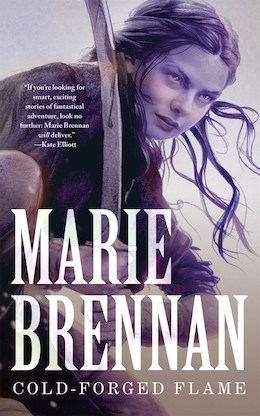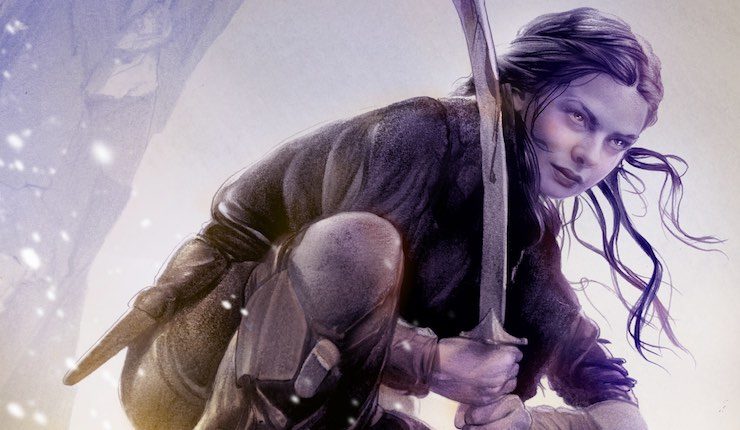I may as well admit it up front: the protagonist of Cold-Forged Flame is based on a character I played for about four years in an RPG.
This isn’t the first time I’ve done something like that, either. My Onyx Court series of novels grew out of a tabletop game I ran back in 2006; my novelette “False Colours” had its genesis in an incident that took place during a one-shot LARP. (I also have story ideas that don’t arise from games, I swear.) One common piece of writing advice holds that games don’t make for good fiction… so why do I keep doing this?
Before I can answer the “why,” I have to answer the “how.” Since the beginning of this year I’ve been blogging at Book View Café about RPGs as a form of storytelling, and one of the points I keep returning to is how RPG narratives aren’t the same as those you find in fiction, for a whole host of reasons. Their pacing and focus is different; they’re mediated by systematic randomness; there’s no single person in control of the entire thing; I could keep going. Beginning writers get cautioned not to try and write stories based on games because it’s a lot like writing up one of your dreams: it sounds awesome to you because you were there and involved, but to an outsider it tends to sound like a disjointed, badly-shaped mass of events that don’t cohere like a proper piece of fiction.
But that doesn’t mean you can’t get good ideas out of games. It just means you have to understand and accept that you can’t adapt the whole thing. You have to dig into that experience and find the core of it, the little shining seed that’s driving you to revisit that story. Find that seed—and then pull it out, and leave the rest behind.
That’s easier said than done. Games can be great fun, with moments of wonderful character drama or pithy dialogue or other bits of awesomeness you really want to keep. But quite apart from the issues bound up in using the contributions of other players (which would be a whole separate post), you have to free yourself to see that core idea on its own terms, and to alter it in a way that suits the new medium. It’s like adapting a novel for the screen: if you don’t accept that a movie doesn’t work the same way as text on a page, you’re going to wind up with a bad movie. You have to think about what effect you’re trying to achieve, and then identify the bits that are necessary to make that happen. Everything else is optional at best.
What does that look like in practice? Well, Cold-Forged Flame makes a good example, because I know what my own starting points were, so let’s use that. (Minor worldbuilding spoilers for the novella will follow, but I don’t think they’ll ruin anybody’s enjoyment of the story.)
The game this comes from is Changeling: The Dreaming, which is an urban fantasy setup wherein faeries protect themselves against the disbelief and banality of the mortal world by sharing the bodies of a succession of human hosts. My seed in this case was my character: a faerie woman whose emotional/psychological/metaphysical arc over the course of the game held enough narrative potential that all it took to make me want to revisit her story was a chance encounter with a song that sounded like it ought to be her anthem. (“I Will Not Bow” by Breaking Benjamin, for those who are curious.) So my goal, in this novella and its sequels, is to recreate that arc—not in its details, but in its general shape and feel.
What was necessary to do that? Two things, at a minimum. First, I needed her to reincarnate, because her arc depends heavily on the fact that each lifetime tends to replicate a certain pattern. As a corollary to that, I needed her not to remember those previous lives in detail, not without a lot of effort. And second, I needed her spirit to exhibit some kind of inherent duality. In Changeling this is expressed through each faerie having Seelie and Unseelie aspects; in the story I’ve reworked that to a different paradigm.
What wasn’t necessary? Basically everything else. Having a supernatural soul incarnating into a mortal host is a very Changeling-specific idea: dump that. Jettison the urban fantasy aspect, too; make it a secondary world instead. (But they’ll need at least a printing-press level of technology, because of certain details of the character.) Get rid of Courts in the political sense and Banality and the Dreaming itself, and the idea that my protagonist and creatures like her feed on creativity and emotion. Chuck every last bit of that, and then ask yourself: okay, how can I create a setup where entities with an inherent spiritual duality live multiple lifetimes among ordinary humans?
I won’t answer that in detail here, because I don’t want to spoil too much. Suffice it to say that I found a way. And then, with that foundation in place, I went through the character’s game history and picked out the moments that really mattered, the places where she learned a new thing about herself or changed or failed at something important. Those formed the skeleton of the story I’m telling now—again, not in their original form, because that would drag in too much associated baggage. Instead I looked for new ways to create that same impact, or at least a similar one. Nothing from the game is sacred. Everything is subject to change … even the core idea I started out with. If I get halfway through this project and find that I kind of want to take it in a different direction, then I’m going to follow that impulse, because this isn’t the story I told before. It’s a new tale, a flame lit from the embers of the old one.
And that brings us back to the question of why. I stopped playing this character ten years ago, but those embers haven’t burned out yet. The idea still has the power to move me, even after all this time. Anything with that much resilience is worth taking another look at, whether it’s a game or a trunked novel or an idea I never got around to writing.
After all, this character has lived multiple lifetimes, each one a variant on the same theme. There’s no reason the same shouldn’t be true of her story.
opens in a new window Marie Brennan is the author of multiple series, including the Memoirs of Lady Trent, the Onyx Court, the Wilders, and the Doppelganger duology, as well as more than forty short stories. Her novella Cold-Forged Flame is now available from Tor.com Publishing. More information can be found at her website.
Marie Brennan is the author of multiple series, including the Memoirs of Lady Trent, the Onyx Court, the Wilders, and the Doppelganger duology, as well as more than forty short stories. Her novella Cold-Forged Flame is now available from Tor.com Publishing. More information can be found at her website.










